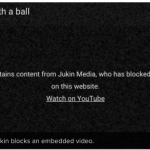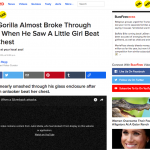Reshaped & ruined video landscape


BY BRIAN KOERBER From Mashable
It’s Viral Market Crash week on Mashable. Join us as we take stock of the viral economy and investigate how the internet morphed from a fun free-for-all to a bleak hellscape we just can’t quit.
Jukin Media is like an internet mob boss.
With nearly 50,000 videos in their library, it owns a huge chunk of the viral videos on the internet, and it decides who gets to share those clips — and they don’t come cheap. Yet you’re probably blissfully unaware of the company that’s behind the scenes pulling the viral strings.
As a company, what Jukin does is relatively simple: It finds undiscovered videos, buys them or strikes a revenue share from the owners thirsty for viral fame or money. It then licenses the clips for rebroadcast — to everyone from the local news to highlight reel shows on MTV.
On one hand, it’s a great service for TV shows looking to find some easy content. Jukin helps connect video owners with broadcasters that have wide reach. But licensing companies like Jukin also play a very disruptive role in the viral video economy.
How the viral sausage gets made
Part of what makes the internet so great is the ability to easily share things you enjoy with your friends, family, and followers. That’s the old-fashioned recipe for viral success.
But when licensing companies like Jukin get involved, things can get messy. Jukin actively stops certain websites from embedding videos it has licensed. It also issues DMCA takedowns (which are a common way for copyright owners to remove unwanted reposting of their content from the internet) for things like GIFs and memes.
By controlling who can share the video and where, they can limit the potential viral reach of that video. And, to be clear, we’re talking here about organic moments captured by normal internet users, or user generated content (UGC). Not whatever’s on YouTube’s Trending section.
Let’s say you shoot a really great video, and you upload it to YouTube. It gets submitted to r/videos on Reddit and starts to really go viral. Then you get a call from Jukin and make a deal. That’s where things take a turn. The moment you hand over your rights to Jukin, that video is no longer yours to share, and Jukin isn’t going to let a company use it unless it pays a hefty fee.
You can say goodbye to your place on the front page of the internet.
Sure, working with a third-party licensing company like Jukin can get your video to places it normally wouldn’t go and earn you money. But it also heavily restricts where that video can be embedded.
Take Reddit. Rule number eight on the massive r/videos subreddit states that no videos with “third party licensing” are allowed: “Videos that become licensed after they are posted will be removed.” You can say goodbye to your place on the front page of the internet.
Getting booted off Reddit may not seem like a big deal, but a video that goes viral on the platform has a huge impact. With 330 million monthly active users, things that take off there have the ability to define conversation on all other platforms and also heavily influence media coverage. That’s how people end up on The Today Show and with hefty book deals.
This content is blocked
At Mashable we often cover viral videos, some of which we first find on Reddit. But no matter where we find it, if you’ve licensed your video with Jukin, we can’t embed it on our site (pretty much the only way to make it easily viewable to our audience), because Jukin has effectively shut us out, along with other large media companies.
It’s essentially a shakedown. Jukin wants us to pay a large fee in order to simply embed videos from YouTube. Mind you, we aren’t even hosting these videos on a native player. These are videos that are entirely hosted by YouTube and any ad revenue from them goes to Jukin.
A YouTube spokesperson confirmed to Mashable that it allows content creators to control which sites can and cannot embed videos. While other social media platforms, like Twitter and Facebook, allow users to control their content by making it private, the option to blacklist specific sites is not common for embedding media.
So why go to the trouble of blocking select publishers from sharing these videos with a wider audience? “We just aren’t seeing the monetization on YouTube embeds to make it worth our time for us and our video owners,” Jukin’s Chief Growth Officer Cameron Saless wrote Mashable in January 2016. While Saless is citing “time” here, blocking a website from embedding likely takes up more time than just leaving it open for all to embed.
In a recent email to Mashable, Jonathan Skogmo, Jukin’s founder and CEO further explained their stance on blocking sites.
“Our goal is to ensure our partners — the owners of compelling amateur videos — receive fair market value for their content, which in the aggregate generates millions of pageviews per month for certain publishers. We like to have a dialogue with publishers, and if they take the stance that, ‘we won’t pay for videos like this,’ even though the benefits of using the content are clear, then we may decide that it’s in the best interest of our video partners to prevent sites from using that content for free.”
So places like Mashable just can’t share Jukin’s viral videos with our audience — big deal, right? There’s plenty of other fun stuff out there for us to write about. Well, maybe, but it raises a bigger question: Is this good for the internet?
The bigger cost
Jukin protecting its videos and brands so fiercely can limit a video’s organic viral spread. The company intensely monitors its content across the internet — and it’s not shy about enforcing DMCA takedowns or taking people to court who it believes infringe on its copyrights.
In a blog post about viral videos from 2015, Mike Skogmo, Jukin’s VP, Head of Marketing & Communications, explained how certain videos go viral. In it, Mike highlighted this clip from April 2015, in which a silverback gorilla charges a little girl taunting the animal at the Omaha Zoo, breaking the enclosure’s glass.
“According to a quick Google search, more than two hundred websites and news outlets covered this story, which accounts for the bulk of those ~20 million embedded player views,” Mike wrote, listing BuzzFeed as a top referrer with over 2 million views.
When you venture to that post from BuzzFeed curating the video, it’s now blocked on their website. Though Jukin bragged about how many embedded views a good clip could rack up, it has since decided to block one of its biggest referrers.
It should be noted that users can still view the video by clicking through to YouTube, but that’s an extra step many readers are unwilling to take.
It’s especially problematic because Jukin picks and chooses the media companies it blocks from embedding. IFLScience, Daily Dot, and SBNation — all top referrers according to the post — are not blocked. It’s unclear if that’s because those companies have since struck a deal with the company. According to Jukin a “handful” of sites are banned from embedding its content, and it’s based upon “volume of embeds and size of the site.”
But blocking a powerhouse like BuzzFeed, a site that’s so immensely influential in the viral media space, can clearly influence a video’s potential to get its biggest possible audience. The viral stories of the day are often copycatted by multiple outlets, and BuzzFeed, with its large staff and massive audience, often sets the tone and strikes first.
BuzzFeed declined to comment on the block or its relationship with Jukin Media.
Ironically, Jukin even took down YouTuber DevinSuperTramp’s video for titling it “People are Awesome.” The company owns the copyright because “People are Awesome” is one of its brands, and well, it didn’t go over so well. Jukin later apologized for not reaching out to Devin first, but as both parties put it — it was already too late. The strategy of strike now, think later works for most people trying to piggyback and steal content, but it also creates enemies, and can ruin the spread of a video.
It is not, of course, unusual for a big company that dominates a marketplace to rule with brute force. But it isn’t the only way to profit off the viral economy. Viral Hog, another third-party licensing company similar to Jukin, does not block specific websites from embedding its content — though founder Ryan Bartholomew said that wasn’t necessarily off the table for the future.
To see how this all plays out in the real world, take the example of Mason Ramsey, or as the internet dubbed him, “Walmart yodel boy.” As you may remember, a clip of Ramsey yodeling in a Walmart took off in late March and early April and he became one of the largest “viral video” success stories of 2018.
But the original video, which was licensed and uploaded by Viral Hog only has about 2.6 million views on YouTube and just a meager 300,000 on Facebook.
That clip of Ramsey didn’t catch on for a few days, and when it did a good portion of the chatter was happening on Twitter through stolen re-uploads, memes, and remixes, which were not immediately taken down.
Then on April 1, almost a week after the video first emerged, YouTuber Sonnel official re-uploaded the same clip. That version currently has 55 million views — far more than the original uploaded by Viral Hog. While there’s no exact answer for why that video took off, it’s likely because the Sonnel video has a more SEO-friendly title. Viral Hog’s original title doesn’t include the word “yodeling” or “yodel,” which Ramsey became famous for.
It’s impossible to say for sure, of course, but it seems very unlikely that Ramsey would have become an overnight star if that video had been licensed by Jukin. Sure, Viral Hog does send takedown requests and makes its fair share of copyright claims, but it’s not nearly as vicious as Jukin, which has a reputation in the industry for being brutally protective.
Viral Hog is losing out on subscribers and giving away control, but this allows the video to grow on the internet in an organic way.
In a phone call, Viral Hog founder Bartholomew said that it has claimed Sonnel’s copy on YouTube, meaning all the revenue from that clip will be directed to Viral Hog, but the company made the decision to not take the clip down. Viral Hog is losing out on subscribers and giving away control, but this allows the video to grow on the internet in an organic way.
While Viral Hog doesn’t love that a bunch of duplicate videos are out there with possibly misleading or defamatory titles, it does have the effect of making Ramsey a much hotter commodity, which in turn leads to even bigger opportunities.
Bartholomew explained, “We’re always looking out for our clients first. If you block something too much, it may not go viral and even though if you allow more free use on it … it may be leeching in a sense that there’s no money being made for the client. It can inspire more licenses later. Give away something, make it more popular and then others will purchase it.”
With that said, Bartholomew notes that a third party licenser can’t “make every video” go viral.
“Ultimately, it’s the desire of somebody to share it that makes it go viral. So, the argument against my own statement before would be — even if you block it, if it really is something that wants to be shared it’s still gonna get shared … but at the same time, it’s more of a kick start. If something is desirable and you allow it to spread rapidly by not hindering it … you can affect the virality but you can’t really make an unappealing video viral.”
Both Jukin and Viral Hog told Mashable that claiming a video’s revenue is preferred over takedowns.
The financial upside of licensing
Of course, Jukin’s strong enforcement of its licenses isn’t bad for everyone on the internet. The company is helping people with good content get exposure — and maybe more importantly, helping to line those people’s pockets with that much-desired internet money.
The company boasts it will have paid out more than $20,000,000 to amateur video creators by the end of 2018. (Yes, you read that number right.) The company’s CEO, Jonathan Skogmo, says “the majority of Jukin partners will earn somewhere between $500 and $2,000 for one video.” Obviously, the payout of a video depends on many different factors — some people have received more than $50,000 from a single clip licensed through Jukin.
For now there are very few ways to make cash off a viral video that don’t involve signing over your rights to a licensing company.
For now there are very few ways to make cash off a viral video that don’t involve signing over your rights to a licensing company. Earlier this year, YouTube changed the way it lets creators earn money. Now, people aren’t able to monetize videos on their channel unless they have 1,000 subscribers and 4,000 hours of watch time on their channel within the last year.
Even then they still have to apply to be part of its Partner Program, and that can take time. According to a YouTube spokesperson, the application review process for its partnership program can take nearly a month. With the short shelf life of viral videos in 2018, that time is incredibly valuable to someone with a one-off viral video.
Outside of YouTube, there just aren’t a lot of paths to make money off of a viral video. Twitter allows businesses to add preroll to their videos, as does Facebook, but for normal people with a fun video to share that’s not really an option.
So in many ways Jukin and other third-party licensing companies are providing a very necessary service to the economy of the internet. In a world where content is often free and disposable, Jukin puts money into the pockets of users with an experience they’d like to share.
Sure, people with desirable videos could broker these deals themselves, but not everyone has the know how to do that effectively and working with a third-party company makes it much easier.
Jukin also allows companies to license videos that don’t really have that viral potential. What if a company wants to make a commercial with some homemade video of kids playing with a puppy? A video like that (while adorable) may never go viral on its own, but it can still generate revenue for both Jukin and the video owner if they place it in an ad.
And in addition to licensing user generated content — Jukin is trying to expand its portfolio.
Ultimately, the reality is if you have a video that goes viral and you don’t license the clip, someone else will likely try to profit off of it.
Jonathan Skogmo said, “We help advertisers strategize and execute creative ad campaigns centered around UGC, and we produce original programming for TV and digital. Our domain expertise in UGC and viral videos has given us a great opportunity to help brands with their content and creative needs.”
Ultimately, the reality is if you have a video that goes viral and you don’t license the clip, someone else will likely try to profit off of it. It’s just how the internet works in 2018.
“If you don’t have it represented, it’s just going to get stolen openly. Money’s still going to be made, but it’s gonna be made by people other than you … it’s the lesser of two evils. Somebody’s gonna make money. Do you want to control it?” Viral Hog’s Bartholomew said.
We’re at a weird crossroads in the viral economy. Jukin Media was founded way back in 2009, a pivotal time in internet history. Smartphones equipped with HD video cameras attached to high-speed internet were in nearly everyone’s pockets, and the web became inundated with video that looked and sounded great. By that year, 62 percent of Americans visited video sharing sites, compared with just 33 percent in 2006, according to Pew’s research.
Jonathan Skogmo, who was working at the time for Discovery as a TV producer on a clip show, saw a business opportunity. While a few “mom and pop shops with older analog video libraries” were licensing out videos, nobody had really ventured into the digital space to do the same.
As he put it, “We created a marketplace for viral videos where such a marketplace never existed before. When people look back at this period of growth and maturation for online video, Jukin will stand out as a company that was able to properly and accurately put a value on UGC video, which to many people was an afterthought.”
And he is right. Jukin forever changed how the internet operates and set the tone during this weird growing phase. But it’s also turned viral videos into viral greed.
IMAGES:
Buzzfeed Jukin video blocked
IMAGE: MASHABLE SCREENSHOT
What you see when Jukin blocks an embedded video.
IMAGE: MASHABLE SCREENSHOT
IMAGE: VICKY LETA/MASHABLE
For more on this story and video go to: https://mashable.com/2018/08/06/jukin-media-viral-videos/?utm_cid=mash-prod-nav-sub-st#R0_GXxL77qqA








